
Abraham Lincoln was an American lawyer, politician, and statesman who served as the 16th president of the United States from 1861 until his assassination in 1865. He led the United States through the American Civil War, defending the nation as a constitutional union, defeating the insurgent Confederacy, playing a major role in the abolition of slavery, expanding the power of the federal government, and modernizing the U.S. economy.

The American Civil War was a civil war in the United States between the Union and the Confederacy, which was formed in 1861 by states that had seceded from the Union. The central conflict leading to war was a dispute over whether slavery should be permitted to expand into the western territories, leading to more slave states, or be prohibited from doing so, which many believed would place slavery on a course of ultimate extinction.

The Emancipation Proclamation, officially Proclamation 95, was a presidential proclamation and executive order issued by United States President Abraham Lincoln on January 1, 1863, during the American Civil War. The Proclamation had the effect of changing the legal status of more than 3.5 million enslaved African Americans in the secessionist Confederate states from enslaved to free. As soon as slaves escaped the control of their enslavers, either by fleeing to Union lines or through the advance of federal troops, they were permanently free. In addition, the Proclamation allowed for former slaves to "be received into the armed service of the United States". The Emancipation Proclamation played a significant part in the end of slavery in the United States.
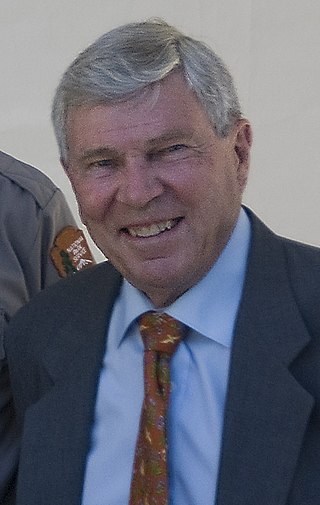
James Munro McPherson is an American historian specializing in the American Civil War. He is the George Henry Davis '86 Professor Emeritus of United States History at Princeton University. He received the 1989 Pulitzer Prize for Battle Cry of Freedom: The Civil War Era. McPherson was the president of the American Historical Association in 2003.

Thomas James DiLorenzo is an American author and former university economics professor who is the President of the Ludwig von Mises Institute. He has written books denouncing President Abraham Lincoln.
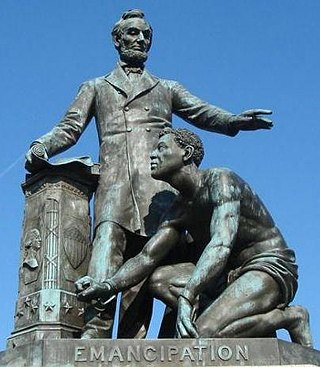
Abraham Lincoln's position on slavery in the United States is one of the most discussed aspects of his life. Lincoln frequently expressed his moral opposition to slavery in public and private. "I am naturally anti-slavery. If slavery is not wrong, nothing is wrong," he stated. "I can not remember when I did not so think, and feel." However, the question of what to do about it and how to end it, given that it was so firmly embedded in the nation's constitutional framework and in the economy of much of the country, even though concentrated in only the Southern United States, was complex and politically challenging. In addition, there was the unanswered question, which Lincoln had to deal with, of what would become of the four million slaves if liberated: how they would earn a living in a society that had almost always rejected them or looked down on their very presence.
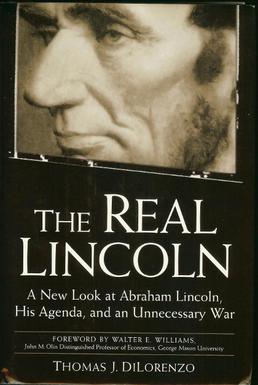
The Real Lincoln: A New Look at Abraham Lincoln, His Agenda, and an Unnecessary War is a biography of Abraham Lincoln written by Thomas J. DiLorenzo, a former professor of economics at Loyola University Maryland, in 2002. He was severely critical of Lincoln's United States presidency.
Neoabolitionist is a term used in historiography to characterize historians of race relations motivated by the spirit of racial equality typified by the abolitionists who fought to abolish slavery in the mid-19th century. They write especially about African-American history, slavery in the United States, the American Civil War and the Reconstruction Era.
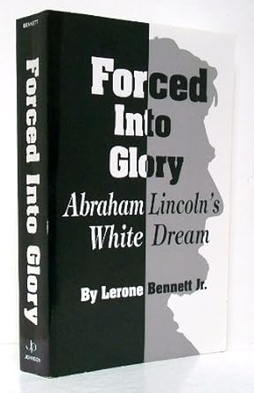
Forced into Glory: Abraham Lincoln's White Dream (2000) is a book written by Lerone Bennett Jr., an African-American scholar and historian, who served as the executive editor of Ebony for decades. It criticizes United States President Abraham Lincoln and claims that his reputation as the "Great Emancipator" during the American Civil War is undeserved.

During the American Civil War (1861–1865), Maryland, a slave state, was one of the border states, straddling the South and North. Despite some popular support for the cause of the Confederate States of America, Maryland did not secede during the Civil War. Governor Thomas H. Hicks, despite his early sympathies for the South, helped prevent the state from seceding.

Allen Carl Guelzo is an American historian who serves as the Thomas W. Smith Distinguished Research Scholar and Director of the Initiative on Politics and Statesmanship in the James Madison Program at Princeton University. He formerly was a professor of History at Gettysburg College.

The Loyal War Governors' Conference was an important political event of the American Civil War. It was held at the Logan House Hotel in Altoona, Pennsylvania, on September 24 and 25, 1862. Thirteen governors of Union states came together to discuss the war effort, state troop quotas, and the ultimate support of President Abraham Lincoln and his Emancipation Proclamation. The leaders also suggested the removal of General George B. McClellan as commander of the Army of the Potomac. The meeting was established and hosted by Pennsylvania Governor Andrew Gregg Curtin, who was a staunch defender of the war effort and Lincoln Administration policies. Ultimately, the event provided Lincoln much-needed support from the Northern states.

President Lincoln and Soldiers' Home National Monument, sometimes shortened to President Lincoln's Cottage, is a national monument on the grounds of the Soldiers' Home, known today as the Armed Forces Retirement Home. It is located near Brookland in Washington, D.C. President Lincoln's Cottage was formerly known as Anderson Cottage.
This bibliography of Abraham Lincoln is a comprehensive list of written and published works about or by Abraham Lincoln, the 16th president of the United States. In terms of primary sources containing Lincoln's letters and writings, scholars rely on The Collected Works of Abraham Lincoln, edited by Roy Basler, and others. It only includes writings by Lincoln, and omits incoming correspondence. In the six decades since Basler completed his work, some new documents written by Lincoln have been discovered. Previously, a project was underway at the Papers of Abraham Lincoln to provide "a freely accessible comprehensive electronic edition of documents written by and to Abraham Lincoln". The Papers of Abraham Lincoln completed Series I of their project The Law Practice of Abraham Lincoln in 2000. They electronically launched The Law Practice of Abraham Lincoln, Second Edition in 2009, and published a selective print edition of this series. Attempts are still being made to transcribe documents for Series II and Series III.

The Frémont Emancipation was part of a military proclamation issued by Major General John C. Frémont (1813–1890) on August 30, 1861, in St. Louis, Missouri during the early months of the American Civil War. The proclamation placed the state of Missouri under martial law and decreed that all property of those bearing arms in rebellion would be confiscated, including slaves, and that confiscated slaves would subsequently be declared free. It also imposed capital punishment for those in rebellion against the federal government.

Slavery played the central role during the American Civil War. The primary catalyst for secession was slavery, especially Southern political leaders' resistance to attempts by Northern antislavery political forces to block the expansion of slavery into the western territories. Slave life went through great changes, as the South saw Union Armies take control of broad areas of land. During and before the war, enslaved people played an active role in their own emancipation, and thousands of enslaved people escaped from bondage during the war.
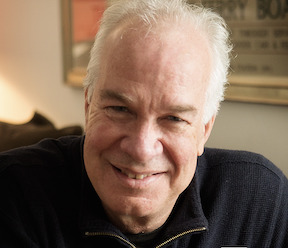
Todd Brewster is an American author, journalist, and film producer. He is presently the senior visiting lecturer in journalism at Mount Holyoke College in South Hadley, Massachusetts.
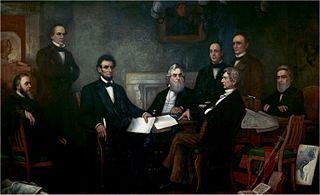
First Reading of the Emancipation Proclamation of President Lincoln is an 1864 oil-on-canvas painting by Francis Bicknell Carpenter. In the painting, Carpenter depicts Abraham Lincoln, the 16th president of the United States, and his Cabinet members reading over the Emancipation Proclamation, which proclaimed the freedom of slaves in the ten states in rebellion against the Union in the American Civil War on January 1, 1863. Lincoln presented the preliminary Emancipation Proclamation to his Cabinet on July 22, 1862 and issued it on September 22, 1862. The final Emancipation Proclamation took effect on January 1, 1863.
The Second Emancipation Proclamation is the term applied to an envisioned executive order that Martin Luther King Jr. and other leaders of the Civil Rights Movement called on President John F. Kennedy to issue. As the Emancipation Proclamation was an executive order issued by President Abraham Lincoln to free all slaves being held in states at war with the Union, the envisioned "Second Emancipation Proclamation" was to use the powers of the executive office to strike a severe blow to segregation.
















